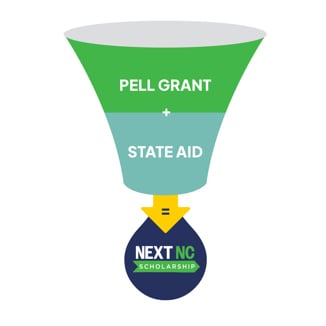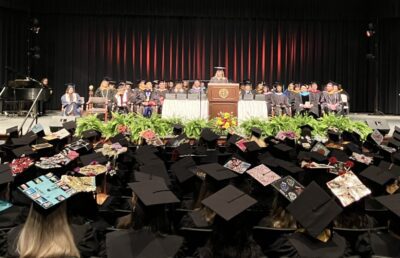
This week is College Application Week, part of North Carolina’s Countdown to College campaign. Between Oct. 20-26, dozens of North Carolina colleges and universities are waiving their application fees.
And North Carolina public high school students may not even need to submit traditional college applications if they are eligible for NC College Connect, which provides automatic admission to certain colleges and universities.
Countdown to College is an annual yearlong campaign that kicks off each October, run by College for North Carolina (CFNC). CFNC’s primary sponsor is the North Carolina State Education Assistance Authority (NCSEAA).
During Countdown to College, prospective students are encouraged to complete three steps toward college enrollment: residency determination, submitting financial aid forms, and completing college admission applications.
A proclamation by Gov. Josh Stein declaring this week to be North Carolina College Application Week says “the State of North Carolina encourages students to use CFNC.org to research higher education opportunities and submit college applications.”
To take advantage of waived application fees, students must apply through CFNC. See the list of colleges waiving their application fees here.
According to data provided by NCSEAA, nearly 18,000 unique applications were submitted last year during College Application Week, and nearly 39,000 total applications were completed through CFNC.
Here’s everything you need to know about applying to college through CFNC.org.
![]() Sign up for the EdWeekly, a Friday roundup of the most important education news of the week.
Sign up for the EdWeekly, a Friday roundup of the most important education news of the week.
Residency determination
Verifying North Carolina residency can qualify prospective students for in-state tuition and financial aid.
Whether you are able to claim North Carolina residency for the purposes of in-state tuition and financial aid depends on many factors — chiefly, you must have lived in North Carolina for 12 months. For more information, see the “RDS Eligibility Requirements” section of this FAQ page.
Some colleges will ask for a Residency Certification Number (RCN) in their applications, and it is also used in financial aid forms. Prospective students can receive their number through a process called residency determination, run by the Residency Determination Service (RDS).
After creating a CFNC account, a prospective student can use that account to log in to RDS and complete the residency determination process.
Financial aid, FAFSA, and the Next NC Scholarship
This year’s Free Application for Federal Student Aid (FAFSA) form is already open. The deadline to submit your FAFSA form is June 1, 2026 for UNC System institutions, Aug. 15, 2026 for North Carolina community colleges, and as soon as possible for private institutions, according to studentaid.gov.

The FAFSA is a federal form that makes current and prospective college students eligible for need-based financial aid including federal Pell Grants, work-study programs, and student loans.
North Carolina also uses the FAFSA to determine awards for state grants, and individual colleges use the FAFSA to award their own scholarships.
In North Carolina, submitting the FAFSA may allow you to receive the Next NC Scholarship, which covers the full tuition and fees for all North Carolina community colleges and more than half the cost for public universities for most families making $80,000 a year or less.
The Next NC Scholarship combines federal Pell Grants and state aid into one financial aid award.
Read more about the Next NC Scholarship



According to a press release from NCSEAA, this year’s FAFSA application is streamlined and should only take 30 minutes for most prospective students to complete.
“We heard from many applicants last year that the new FAFSA was much easier than before. That, coupled with the new changes this year, opens access to financial aid to many who were previously hesitant to fill out the form,” said Mary Shuping, the executive director of NCSEAA. “And with an early fall open date, we will be able to reach more students, who will have more time to meet their deadlines.”
Direct admission through NC College Connect
High school students from North Carolina public schools with a weighted GPA of 2.8 or above are automatically eligible for direct admission to certain N.C. colleges and universities through NC College Connect, said Patti Harris, the director of the program.
Harris said it could take less than 10 minutes to create a CFNC account, log into the NC College Connect portal, view the institutions for which they are eligible to claim admission, and claim admission to one or more of those institutions.
As part of the process, students also have the option to send their high school transcript to those institutions for free.
“This is a true gem for the state of North Carolina and for our high school students,” Harris said, referring to NC College Connect.
According to the N.C. Department of Public Instruction, approximately 70,000 students are eligible for NC College Connect this year, and roughly 17% of those students have accepted their offers so far.
The institutions that participate in the direct admission program include UNC System institutions, North Carolina Independent colleges and universities, and all 58 community colleges. See the complete list on this page.
Read more about NC College Connect


After applying to college
Timeka Ruffin, associate outreach counselor at CFNC, said that after applying for college or claiming their spot through direct admission, students can continue to focus their efforts on securing other financial aid.
That may include needs-based or merit scholarships through community institutions like churches, companies, and foundations. Ruffin said lots of those scholarships are available between December and February.
She also said prospective students should check their emails regularly after submitting FAFSA forms, college applications, or other forms, to ensure there’s nothing else they need to do.
Editor’s note: This article has been updated to refer to Patti Harris by the proper last name on all references.
Recommended reading



